Address of author:Beijing City
Date of event:1937-1945
Location of event:Nanchang City, Jiangxi Province; Hengyang City, Hunan Province; Guilin City, Guangxi Province, etc.
Name of author:Shi Shuhua
Name(s) of victim(s):Shi Shuhua’s bother, etc.
Type of atrocity:Air Bombings, Murders, Others(AB, MU, OT)
Other details:”I was living in Nanchang. When the Japanese launched a full-scale invasion in China in 1937, my whole family lived restlessly day and night, running away from the Japanese bombs. We managed to run to another city except that my elder brother was killed in Hengyang in a bombing. In 1944, the Japanese began to attach Guilin and we had to flee once again with others. Even the top of the trains were packed with refugees. One day when we were resting at the platform, we heard that the Japanese had arrived and had to run with the refugees. The next morning we found that many migrant workers and women became captives, and two of the young men walking down the opposite hill were shot by Japanese. We didn’t depart after hiding in the mountains for three days. However, we still ran into the Japanese soldiers who forced us into porter work. My mother would not let go my brother and was wounded by the Japanese. My father got mad that night and died. Later, my sister-in-law fell ill on the way and died because we had no money for treatment. Now we firmly claim compensation from Japan.”
Comrade Tong Zeng:
After my aunt read the article “Demanding Justice from Japan” on the “Weekly Digest”, she wanted to respond to your heroic effort of collecting 100 million signatures. She wrote an account based on my experience. As we were not sure about your address, we mailed it to the “China Research Center on Aging” (“100029”). Have you received it? With the help of the “Office on Aging”, we have attained your address and mailed you a copy, we are not sure if it meets your criteria. Since we were very young at that time and more than 40 years has passed since the war, there might be some discrepancies in the details. I hope you can give us some advice so that we can sort out what exactly happened from my recollection again.
Our address is Room 1122, 12 West Chegongshe Road, Xizhimenwai.
Tel: 6846829-132 Postal code (100044)
Wish you
All the best
Shi Jingyin
4.12
Comrade Tong Zeng:
After reading the article “Demanding Justice from Japan” published on Page 4 of the Weekly Digest on February 3, 1993, I learned that since 1989 you have been engaging in a righteous work in your spare time, and continually published articles in newspapers. Since I rarely read newspapers after retirement, I learned of this thing only very recently. My family is also one of the victims and sustained heavy casualty from the all-out invasion waged by the Japanese invaders in 1937. This war forced eight persons in my family to flee their home; three people perished as a direct consequence of the war. It was not until China’s Communist Party liberated our country and rescued us from death after experiencing all sorts of hardships. My whole family was survived by only four remaining members, who could have been killed also, had the Communist not come. We couldn’t have imagined what life would be today. This was a disaster brought to us by the war. Half a century since, for people like me nearing the age of seventy, our minds are still shrouded by the shadow of war, they dared not reminisce the past, lest it would recall much anguish and pain. After reading the newspaper article, I hesitated for days. Should I write something to you? It would be impossible to avoid the miseries of the past and open the door to reliving a memory which had been buried for decades and striking a heart-wrenching chord in the soul. But if we remained silent, it would be too easy for the enemy, for the bitter hatred bottled up in my chest is bursting to come out. I must lodge the accusation: we want justice from Japan. As to the claim, in fact what were lost could in no way be recovered – the debt of blood of my family’s three lives. After all, what can make up for the loss of our prime and youthful lives?! But we must respond to Comrade Tong Zeng’s solicitation of 100 million signatures for demanding damage compensation from Japan by the Chinese people. This drive reflects that devastation of war and is the scourge of mankind. The Chinese population was 400 million during the Japanese aggression. Half a century had passed, there are still surviving victims. How many innocent people had died during that period? According to what I know, a retired cadre named Li Ruiqing, who worked with me at the time, ran away from the war. He lost contact with his wife; no one knows her whereabouts even today. For this reason he remained single, and was childless in his old age. Cases like this are innumerable. The following is an account of what my family went through during the Japanese Imperialists’ invasion of China between 1931 and 1945. I would like to become a signer of the “Resolutely Demanding Damage Compensation from Japan” campaign. It happened so many years ago, I might have some confusion about the exact dates of some of the things that happened to us, but the general time frame was between 1937 and 1945. Many thanks for your attention!
Wish you
All the best
Written by Shi Shuhua
February 15, 1993
Shi Yangzhi Shi Jingyin Shi Guisheng (Name seal)
Shi Yangzhi (Signature)
My name is Shi Shuhua, female, now 67, a native of Nanchang City, Jiangxi Province, currently residing at Beipei District, Chongqing, a retired cadre of Sichuan Province Tin Mine Construction Second Construction Installation Engineering Company. I want to bitterly denounce that between 1931 and 1945, the invading Japanese sagged our hometown into the hands of evil. My family was forced to leave homes to escape from war. We fled to strange towns, faced immense hardships, and lost three members of our family to the ordeal. The five surviving members of the family faced hardships, numerously escaped death only narrowly. We became refugees. Thanks to the Communist Party of China which liberated China and saved my family from total decimation. The shadow of war nevertheless shrouds our souls even after half a century. When reminiscing over recollection, I always feel extremely sad!
Our home was originally located in downtown Nanchang City. There were nine persons in the family, including my father, my mother, an elder sister, a younger brother, an elder brother, a sister-in-law, two nephews and myself. My father and my elder brother were both junior clerks, the family was not very well-off, but we were able to make ends meet. After my elder sister was married, there were eight people in the family. We stayed together, life was happy and peaceful. But in 1937, the Japanese Imperialists waged an all-out war against China. The peaceful lives we enjoyed so much were gone. Like many people in the rest of the country, our lives were always about running and hiding from Japanese air raids day and night, and seeking shelters at the first sound of sirens. We lived on tenterhooks the entire day, hid here and there, and there were no more schools, or studying. Later the Japanese Invasion Army troops entered Nanchang, our beautiful hometown fell under the iron heels of the invaders, causing people to live in extreme fear and misery. To fight the invaders, my elder brother abandoned clerical job and joined the army. He went to Hunan and joined an anti-Japanese army (the exact troop number I can’t remember now). My father did not want to become a docile citizen living under the puppet regime, and he didn’t want to be a colonial slave for the invaders. He led our family to flee to Yichun where my elder sister lived. When the situation in Yichun also deteriorated later, we had to leave my elder sister, (it never occurred to us that it would be the last time that the family would be intact as we knew it.) We fled to Hunan to look for my elder brother. We settled down in Lingling County, Hunan, after much hardship. My father found menial jobs, my mother and sister-in-law helped him. My elder brother sent us money each month to help out. Slowly our life returned to normalcy. Because Lingling was a small county, though there were occasional air strikes, it was not as dangerous as in Nanchang. We gradually found order in our lives and settled down. My younger brother, along with an elder nephew and I were able to go to primary school. In this way one year passed. Just when we were congratulating ourselves about how life was improving each day, just before the Mid-autumn festival of 1939, my elder brother wrote us about how their troop was relocating and would leave the frontline and transfer to the hinterland to recuperate. He said that he would return home for a reunion for the Mid-autumn Festival. We waited anxiously for the return of my elder brother, expecting it would bring new happiness of reunion to us and consolation to my father, mother, and sister-in-law. But he never showed up despite the fact that we nearly wore our eyes out in expectation. Our whole family became deeply worried, but there were no news. Days passed in anxious waiting, and the bad news came, my elder brother, was killed by bombs dropped by the Japanese planes in Hengyang, while herding horses on route to a new location. The news hit like a thunder bolt out of the blue, shocked us beyond description. Our family shed sad tears. Nothing is more tragic than a parent losing a child in old age, and my sister-in-law losing her husband she deeply loved. She wanted to commit suicide numerous times and it was only after our many persuasions that she gave up the thought for the sake of the whole family. We convinced her that the family’s responsibility was huge, now that we had to take care of both the old and the young. She suppressed her grief and helped shoulder the responsibility. The elder one of the two nephews was only about ten, while the younger one was just able to walk. What could they depend on after losing their father at such young age? My elder brother was the eldest child in the family, the main source of support of the family. In the days to come, we dreaded about how we would make ends meet. Little did we know, horrible and sadder news awaited us. After my elder brother died, we wanted to go and collect the body for a proper burial. But who would take care of the old, women and children in the family? Luckily at that time my cousin also fled to Lingling, we then asked him to handle this matter for us. According to his account when he returned: at the time of the air raid, my elder brother was under a tree near a pond trying to hide from the attack, but the horses he escorted attracted enemy attention and become a big target. Heavy bombing fell on this area. My elder brother was at first wounded and rolled into the pond, but when his body was pulled up, his intestines had spilled out, limbs missing, flesh blood scattered. He was nearly beyond recognition. What my cousin described was a horrible scene. The news devastated our family for a long time.
(The following paragraph is irrelevant, suggest that we not use it it. This purpose of letter is not to write someone’s autobiography.)
((I had always liked to study, I dreamed about becoming a writer, a physician, and a teacher and more. From Grade 1 in the primary school I always ranked top three in the class each semester, on the one hand this was because the top three could enjoy the privilege of free schooling, so that I could reduce family burden; on the other hand, my father was feudalist in mindset, thinking that “Innocence is the virtue for women”, it would be enough if I was able to learn to read, so I could only ensure more years of study with outstanding morality and academic scores. In that year I had just graduated from the primary school, since my elder brother died, the family faced more strained economic conditions, as it turned out I again ranked top in the high school entrance exam, but enrolling into junior high school required full payment of book fee and tuition fee, at that time the whole family had no income for living, where could we find extra money to let me go to school? At the graduation evening party, the teacher asked students to talk about aims and dreams. My classmates were all very joyous, they talked volubly and eloquently with brimming confidence. But my wish to have further study could not be fulfilled, so my dream was dashed, and there’s nothing that I wanted to talk about, I could only shed sad tears, which brought the evening party to an unhappy end. Later, thanks to a warm-hearted classmate, who was also a native of Jiangxi and came here to avoid the war, her elder brother and elder sister were all bank employees, they sympathized with my experience, and called for donation among colleagues, it was one month after the new school term began that they finally managed to pay the tuition for me, so that I was able to continue study. Back then in order to avoid bombing by Japanese aircrafts, the school was relocated to a simply furnished ancient temple in the countryside, the boarding classmates had nowhere to place suitcases. The school learned of my situation, and opened a storage room to ask me to manage it, which changed me to half work and half study, so that my tuition would be exempted. During the time after the school hours, my classmates all happily went out to play, but I had to stay at the storage room to wait for classmates to retrieve or deposit clothing. In this way I entered Grade 2 of junior high school, as my trauma just healed, the Japanese Invasion Army came to Hunan. Changsha experienced a big fire, which threatened the safety of Lingling. What to do? If we stayed there, my family had no hideaway place in the countryside; if we took flight, the question was where we should go. Just when the whole family was in a desperate situation, luckily my uncle (father’s younger brother) worked in a small private factory in Guilin Guangxi, his family had three persons, and was slightly better than us in terms of economic condition. He wrote a letter to invite us to go to his place. My father sold any valuables he could find in the home, and led the whole family to flee to Guilin. My uncle explained the situation to the factory head, and arranged my father and sister-in-law to work in the factory as temporary worker, in this way he saved my whole family from a predicament. On the other hand, I was unable to go to school, and I helped mother to put out a small tea stand to make a living. At this time my younger brother and elder nephew also graduated from primary school, trying to consulate my sister-in-law, my father managed to let the elder nephew to enroll into Hanmin High School, because he was a descendent of Anti-Japanese martyr, he was also granted public fund tuition. My younger brother was unable to continue study, just like myself, and could only help mother to do some small business, in order to make a hard living. Later my cousin thought it was a pity if I stopped study completely, so he signed me up in an accounting reinforcement class, and asked me to go to the night school. One year later, I graduated with outstanding scores. The school learned of my family’s difficult circumstances, and recommended a job in a private factory as accountant assistant. In this way, I not only became independent economically, I was also able to help the family solve partial difficulty. This also was the ultimate aim of my hard study throughout the years. Back then I was only a 16-year old girl! At such age, a girl would normally stay close to her mother, playing the role of a sweet daughter, and dreaming about a promising future, but for me it’s another story, I had to shoulder the heavy burden of family life. When my father led me to see the factory head, the factory head said I was still a child, but my father found out they were fellow townsmen, and talked about our family’s difficulty, the factory head grudgingly agreed to put me on probation. In this way we settled down for three years.))
In the autumn of 1944, disaster struck again, the Japanese invaders rushed toward Guilin, and made a last-ditch effort to win the war. By the time my uncle died in other town at the age a little over 40, my family had no more wills to run. My father asked the family to resign to fate, and stayed in Guilin what come may. With hard work, my family had a small grocery store by that time, we had a simple livelihood. However, tension of the war escalated, wealthy people had all fled. Those unable to flee were now forced to retreat with the KMT government; otherwise their houses would be burned down. The flames of the burning houses spread close to our front door. Factories evacuated. Feeling helpless, my father asked the then 14-year-old elder nephew to evacuate with his school. This might save his life. (That would be the last time my nephew would see his grandparents and his mother.) We used cloth and quilts to made knack bags, we each carried one each and fled. ((Again, there are no grounds to ask for personal compensation in this paragraph. It is a description of the author’s evacuation journey in the war. Suggest that we delete the following paragraph.) Because we left too late, when we arrived at the railway station, we found it was heavily packed with people, the train carriages and even the train roof was crowded with refugees. Inside the city, it was already burning with flame leaping into the sky, there’s no way to go back. We waited for one day, and it took us much trouble to jostle onto a freight train, the train moved along sporadically despite wind and rain, it was a dangerous journey. After several days, suddenly one day the KMT troops said they wanted to take the freight train we were on, and drove down the refugees who were on the train. At this moment, the situation was very urgent, for we could hear indistinct bombing from the frontline. We has no other way, and could only picke up two plank boards, and tied them between the two wheels under the freight train. When the train moved, the whole family stayed immobile on the plank boards; when the train stopped, we would jump down and moved our limbs. In this way we arrived at Nandan, Guangxi, because it was an upward slope, the locomotive was unable to drag many carriages, and it disconnected the several carriages where we stayed on and left. At this time the crowd of refugees swelled, plus KMT evacuation troops, the highway became very crowded to the degree of overflowing. We had no way, and could only abandon the train, took some simple clothing, brought along the old and the young, and followed the crowd to run ahead. Since my mother had bound feet, the younger nephew was only 5, my father was only able to walk three to five li each day because of illness. One evening we walked to a small railway station, everyone was extremely tired, and we could only rough it by sleeping on the platform, intending to take a rest. In the midnight gun fire erupted, which woke us up. We saw the houses of the railway station were in flame, bullets whooped past our heads, refugees scurried in all directions, shouting: Japanese invaders had come. We were so frightened that we forgot to collect the quilt, and followed the fleeing crowd to seek shelter in the bushes high in the mountain. ))
Retreating with the KMT, one day when the day broke, we saw on the highway, and beside the railway track, there were many civilian laborers who were carrying things that were looted by the Japanese army earlier, among them were several kidnapped women. After a while, several young farmers walked down the mountain in the opposite direction, seeing the Japanese soldiers, they immediately turned and ran, the Japanese invaders raised their guns, and shouted “Stop”, but the youths still ran ahead, with a few shots, two people died. We were very indignant, on this sovereign land of China, the invaders were so arrogant and abusive! But we also felt helpless, we hid in the mountain for three says, drank some mountain water when thirsty, and ate puffed rice with grassroots when we were hungry. When we saw there were fewer Japanese soldiers on the road, we climbed down to walk away. There were only felled walls at the roadside; everywhere there were dead bodies of Chinese people. Some old men and children were crying. One white-haired old woman was accompanied by a 2-3 year old child, seeing we approach, she shouted: ‘You do me this favor, take my grandson with you, save his life: I’m old, I don’t care if I die, but he is still young!’ My younger brother pitied her, and took the child and walked a few steps, but seeing our own family was burdened with the old and the young, with nothing to eat and drink, and the danger of collapsing at any moment, how could we save others? We could only hold back tears and put the child back. Such scenarios happened several more times as we moved ahead. This was because after the Japanese invaders came, they lost contact with their family members, were unable to walk on, and could only sit down to await their doom. At that time we were afraid of meeting the Japanese soldiers on the road, so my sister-in-law and I smeared our face with soot of pan and mud, we wrapped the feet with broken cotton padding, and walked slowly with a stick, my younger brother carried all our small bundles and cooking ware. In the morning of the second day we met Japanese soldiers, we dared not to run, and continued walking, they closely examined me and my sister-in-law, then they saw my younger brother carrying our belongings, and wanted to conscript him to help them carry bags. My mother grabbed my younger brother and would not release her hand, Japanese soldiers wielded the gun stock and hit my mother in the head, and blood oozed out immediately, seeing my mother still holding the hand, they pulled back the bolt and pointed the gun at my younger brother; fearing my younger brother would be killed by these beasts, my mother let go of her hand. They took him, turned and left. My mother fainted right there. My father was weak with illness, frightened and angered, he spat blood incessantly. My sister-in-law and I wailed helplessly, but were too despaired to shed tears. We could only slowly move my father and mother toward the thatched shed at the road side. In the evening my father died in the shed. With the help of other refugees, my sister-in-law and I dug a pit with our bare hands, and hurriedly buried my father. My mother’s head wound bled continually, since there was nowhere to find medication, we grabbed a handful of grass ash, and found a cloth to bandage the wound; miraculously, the wound later cured, leaving behind only a bowl-sized scar. Since then, only my mother and daughter remained in our family. Life and death was no longer a consideration for us. We wandered aimlessly, along with the fleeing crowed to go everywhere. As it turned out, the refugee group we were in was a lucky group, according to some other refugees, they personally witnessed that: Whenever the Japanese invaders arrived at a place, the Japanese invaders burned, killed, and raped, ravaged women and children, committed barbaric crimes to make one bristle with anger. Later we arrived at a small town named Liuzhai. At this time Japanese invaders were met setback because of isolation after going too deep into the Chinese territory. They had to retreat. The KMT government saw there were refugees everywhere, who were suffering from hunger and coldness; they showed mercy by issuing return travel allowance to the refugees. There were four people left in my family. We originally asked for travel allowance to go to Nanchang, but in the end what we received was not even enough for one person to travel alone. What was there to do? We must struggle to survive. So we first settled down in a dilapidated house. My sister-in-law and I went to a market in a mountain town 30 li away to save money; we made one trip every three days. We used the money to buy 60 catties of rice, carried it home and sold it to people. In this way we earned 10 catties of rice. We dug wild vegetables; the whole family was able to live like that for three days. In this way we lived for a while in peace; one day, my mother went to the street, and happened to meet my younger brother who had escaped, it would not be hard to imagine the joy of the whole family despite the grief over my father’s death.
Since then, the whole family was bent on returning to Nanchang to find my elder sister. We climbed freight trains, walked on mountain roads, and finally came to Dushan. Disaster never came alone; my sister-in-law, who was exhausted both in spirit and strength, fell ill. As we had no money to seek medical treatment, she died from both illness and poverty at the age of just 35. At that time the younger nephew was demobilized from the school and returned to Nanchang, he found my elder sister, and studied at school for a number of years. After Nanchang was liberated, he joined the army. Currently he is a retired cadre of the State Commission of Science and Technology for National Defense Industry. After my sister-in-law died, we then fled to Zhenyuan, Hunan Province, where we found us again out of resources. In order to reduce family burden, we were forced to send the younger brother to join the army. Through recommendation of a warm-hearted fellow townsman, I found a job to teach students in a primary school, so as to maintain the minimal living standard of a three-person family, and struggled on the verge of death, until the autumn of 1945. In Guilin, my father missed the hometown very much, and wanted to go alone to the hometown to have a look, because there was no travel expense, he never made the trip before he died. After liberation, in 1964 I was on a business trip from Sichuan to Guizhou, on the road I passed Guangxi, when recollecting the scenes of refugee life in 1944 and the death places of father and sister-in-law, and it occurred to me that I didn’t even know where their graves were, I felt as if my heart was pierced by knife, and felt extremely sad. Coupled with the hardship experienced when I was young, as well as other shocking incidences, the combined weight of the stress triggered schizophrenia. I was promptly sent to hospital for treatment, luckily, I am basically rehabilitated now. However, I do not handle stress well. I sent my younger nephew to the orphanage as I was unable to raise him. Under the nurture of CPC and the people’s government, he is now a government cadre, and works in Liangshan ethnic minority regions. My younger brother Shi Yangzhi was sent home after liberation because of illness, since he had little education and with weak physique, he had no formal job and remained single. He had to work hard to make ends meet. My husband abandoned home to join the revolution after his hometown in Hebei fell into the hands of the enemy in November 1937, fought in the north and south. No news came about him or his whereabouts. His grandfather and mother who loved him very much and wanted to see him before their deaths cried his name in the three days before they died, one after another, in bitterness. He did, however, manage to stay alive. In 1944, he was injured and disabled in battle. He is now a Class 3 disabled army man. Owing to battle injuries, he was handicapped in the legs, which caused cervical spondylosis to suppress the auditory and olfactory nerves, resulting in deafness. He lived with enormous inconvenience in his old age. All the aforementioned descriptions are the persecution, calamity and resentment in blood and tears against Japanese imperialism who invaded and waged war against us.. We resolutely demand justice from Japan, and firmly request to join the signature drive seeking compensation from the Japanese government to innocent victims of it aggression. We will not stop until Japan offers formal apology and makes compensation to the victims of the war.
Written by Shi Shuhua
Currently residing at Room 233, 325 Yutangwan, Beipei, Chongqing
Shi Yangzhi Shi Yangzhi (Signature)
Shi Jingming
Shi Guisheng (Name seal)
February 18, 1993














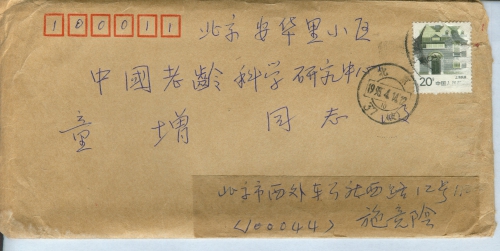
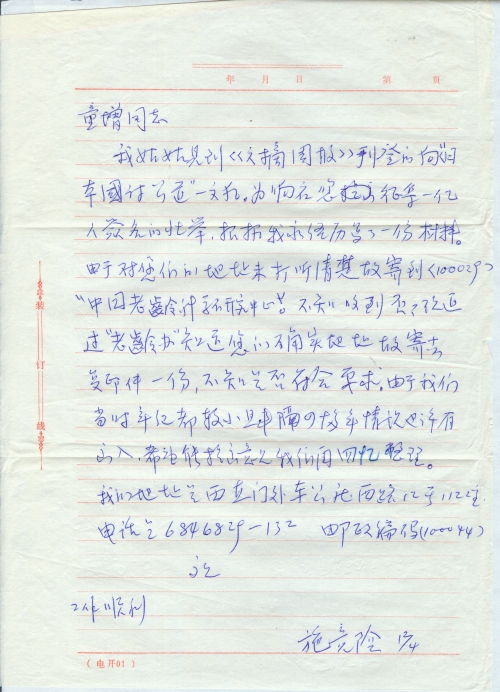
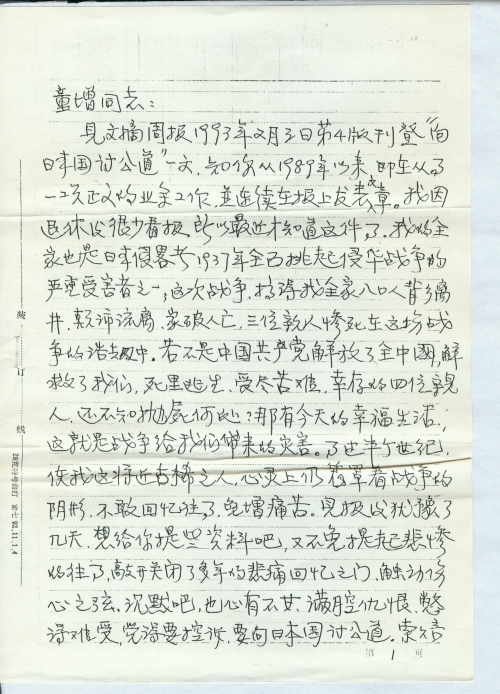
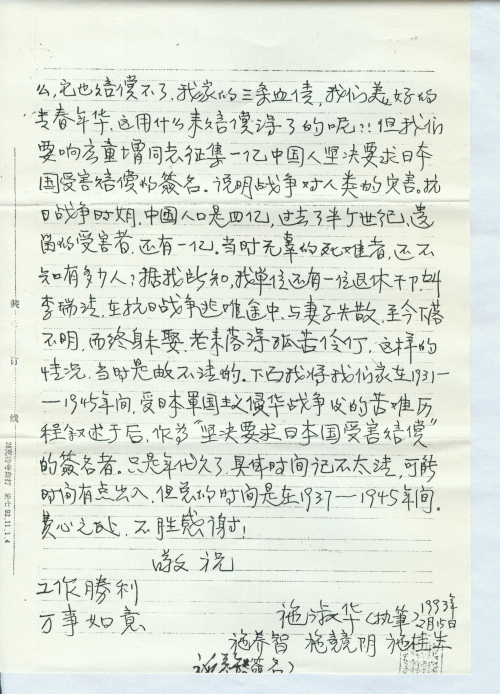

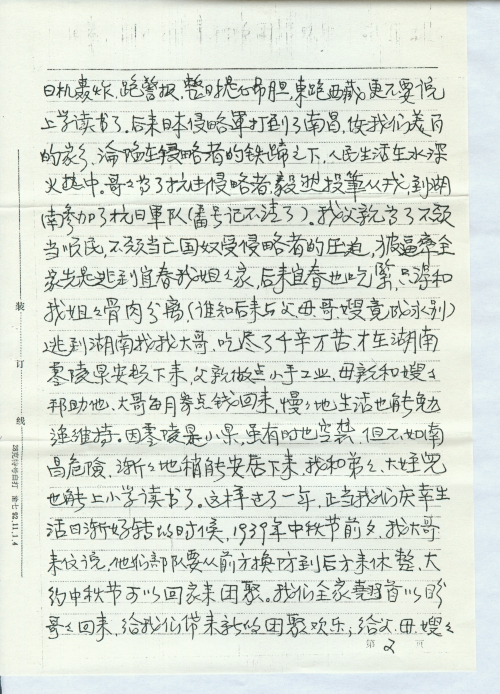
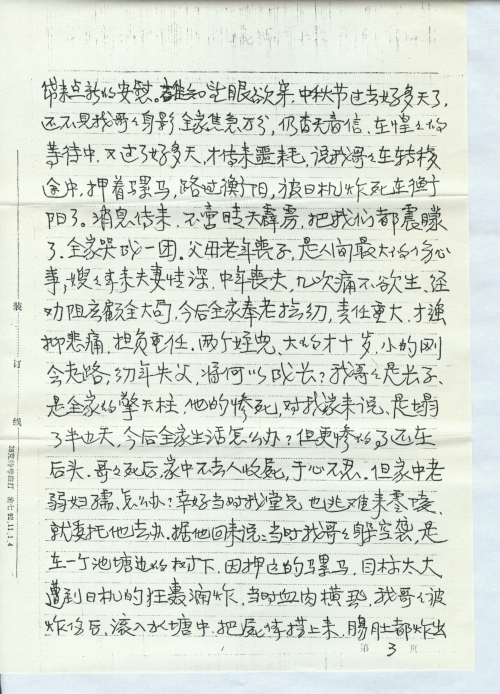
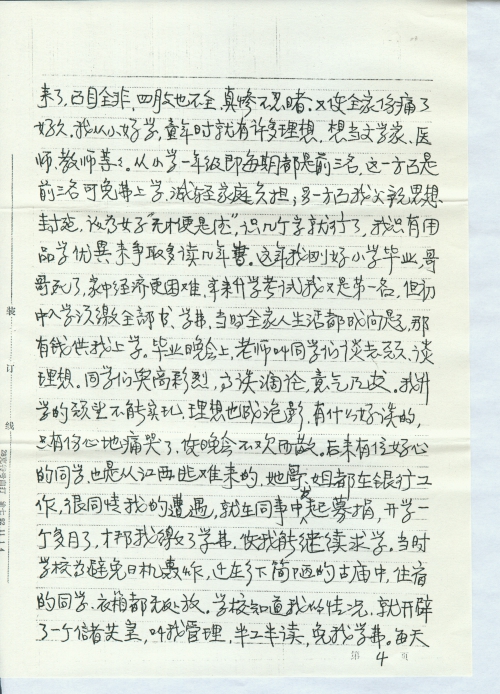
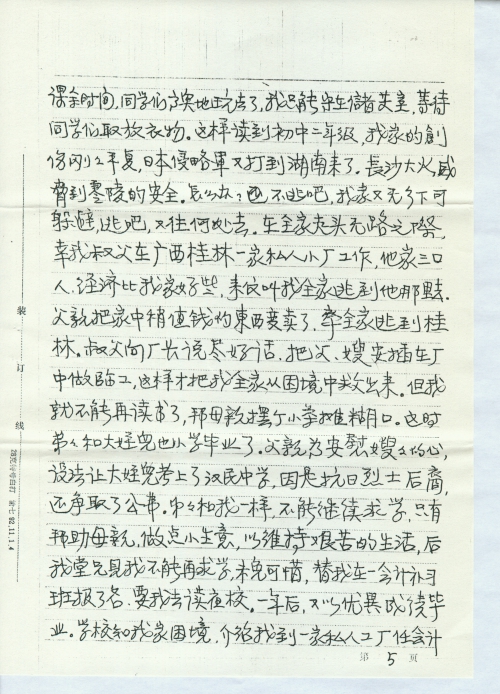
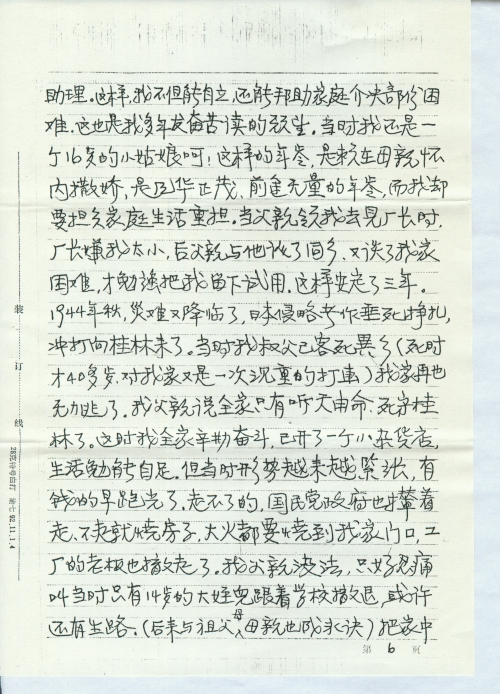
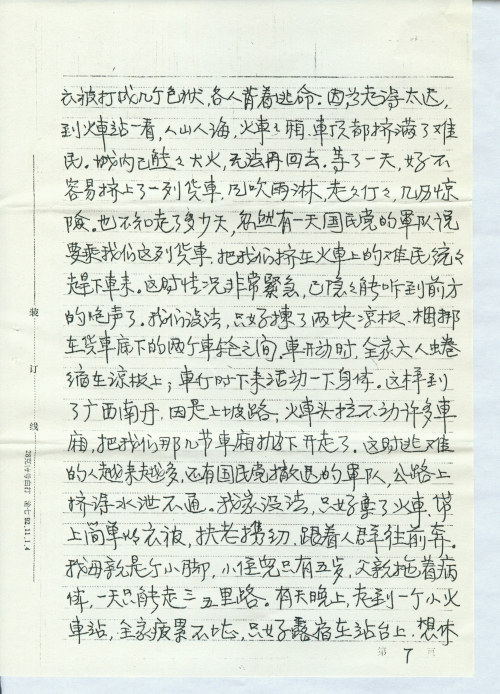
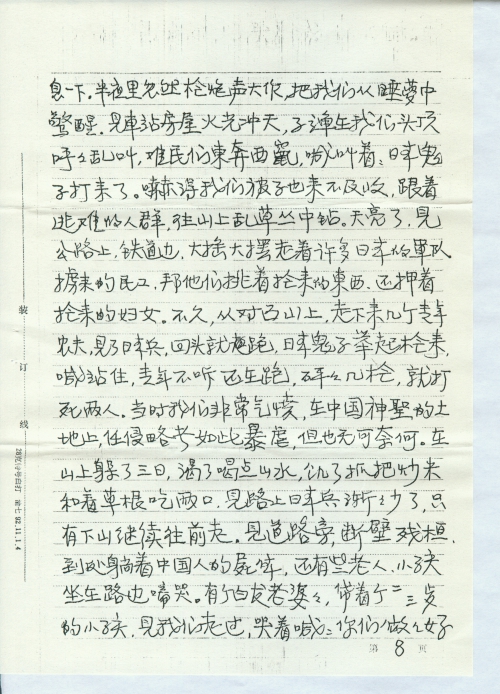
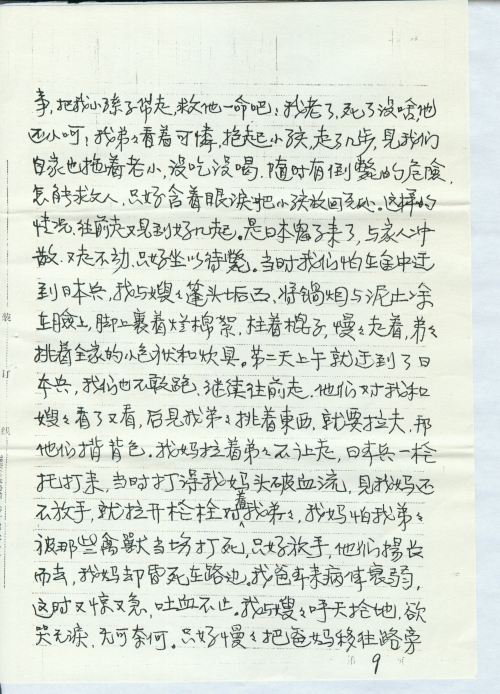
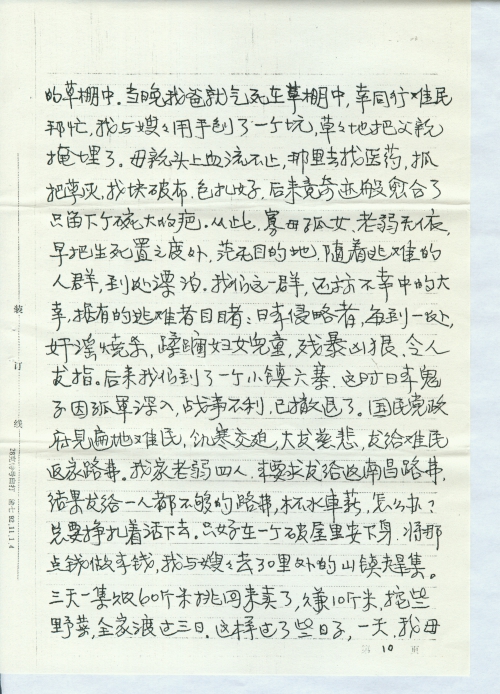

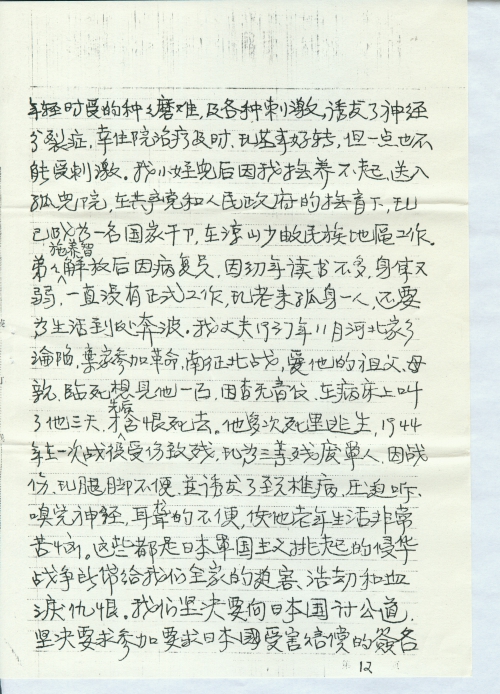
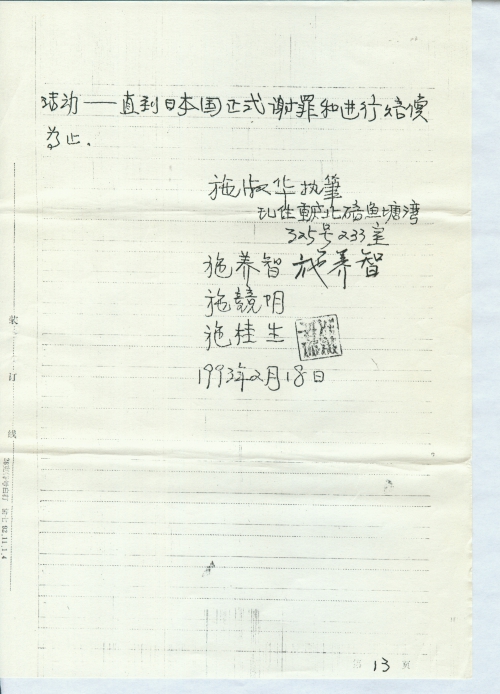
O